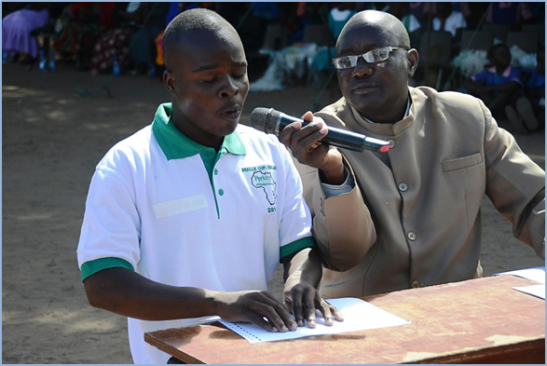
Aug. 2014—One by one, the learners come to sit near the podium. They are escorted by their teacher, not because they cannot walk on their own, but because these students are blind. Upon arriving at the table, the learners are given a piece of paper. A look at the piece of paper shows no text for the learner to read. There is not a single letter, no sentence, no paragraph. However, a closer look at the paper shows something else—colorless, raised dots, or braille.
Slowly, the students begin to move their fingers over the passage, and before long, they start reading the passage. Line after line, the tips of their fingers move from left to right.
“Once upon a time, a hare wanted to propose to a hyena for marriage. He did not know how to approach the hyena because they had not talked before. One day, the hare said to himself that he will meet the hyena and tell her that he wants her for marriage …,” a student reads out loud from the comprehension portion from the braille passage.
For the first time in Malawi, blind and visually impaired students from five schools are gathered in one place to compete for the first Braille Cup. Ekwendeni School for the Blind represents the Northern Region; resource centers in Malingunde, Nsiyaludzu and the hosts, Salima, represent the Central Region; while the Southern Region is represented by Montfort School for the Blind. As a partnership between the USAID Early Grade Reading Activity and the Malawi Ministry of Education, Science and Technology, the Braille Cup competition showcases the skills of blind learners in spelling, reading fluency, proofreading, reading comprehension and oral essay presentation.
Listening to the blind learners sing and seeing them jump with excitement, win prizes, interact and pose for photos, one needs no further evidence that the Cup has achieved its objectives. Far beyond reading skills alone, the Cup raises societal expectations for students who are blind to succeed socially and academically.
“Today’s Braille Cup is an academic competition, a model for good sportsmanship and social inclusion. It is an opportunity to inspire students to learn to read, stay in school and reach their full potential,” said Christine Djondo, USAID/Malawi’s education team leader.
Malawi has 210,000 blind people, and over 70,000 of them are both blind and deaf. The Braille Cup is an example of the innovative programs that USAID and its partners promote to encourage comprehensive and inclusive development. The U.S. Government, through USAID’s Early Grade Reading Activity, is investing in technology, innovation and skills to help blind Malawians get an education. Whether students are sighted or blind, education begins with reading.
The USAID/Malawi Early Grade Reading Activity is a three-year, $24 million program implemented by RTI International in August 2013. It promotes quality early grade reading instruction, the production of high-quality reading and learning materials in Chichewa and English, improved policy for reading at the national and local levels, and building a community of reading within and outside the school setting. An evaluation is currently under way to measure the impact of this intervention and how household factors and other USAID/Malawi activities affect reading scores in participating schools.
LINKS
Follow on Facebook







Comment
Make a general inquiry or suggest an improvement.